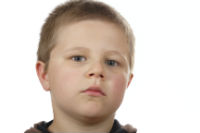How a Child Learns to Make Good Choices
Conventional wisdom says that a child doesn’t have a conscience until the “age of reason,” considered to be around seven years of age. Yet you begin nurturing a little conscience from birth. After watching how his models live and processing thousands of interactions during the early years, the child collects a large storage file of “normal behaviors,” a code of how he is supposed to behave. Once the child incorporates these internal codes (his norms) as part of his growing self, it bothers him to deviate from them, and he learns to make good choices on his own.
Think of conscience as an internal “bother button” that goes off if a child thinks or acts contrary to the code he’s internalized. There’s also a positive side to a conscience—a child feels good inside when he makes good choices by himself.
Knowing Right and Wrong
Between seven and ten years of age, a major breakthrough in moral reasoning occurs – the ability to figure out if an action is  right or wrong, not because the parents said so or out of fear of punishment, but because the child knows it. This is the beginning of a true conscience. The child has internalized your values and made them his own, and now he starts to make good choices on his own. The key to conscience-building is to surround the growing child with healthy choices early on so that when he is inevitably exposed to unhealthy choices they will disturb him.
right or wrong, not because the parents said so or out of fear of punishment, but because the child knows it. This is the beginning of a true conscience. The child has internalized your values and made them his own, and now he starts to make good choices on his own. The key to conscience-building is to surround the growing child with healthy choices early on so that when he is inevitably exposed to unhealthy choices they will disturb him.
A conscience may not mature until the child is nine or ten, but it is built from birth. The child who enters the age of conscience without an internal reference file is at a disadvantage. Like a gardener who waited too late to plant crops, parents find that values taught later in childhood may take root, but the roots are not as deep as if they had been planted in the right season.
Help Your Child Learn About Their Conscience
Beginning some time around six or seven years of age, or whenever you feel your child has the ability to understand, teach your child what a conscience is. Try what we call the “Pinocchio principle” with your child: “You will have two voices inside you, a ‘do right’ voice and a ‘do wrong’ voice. Sometimes the ‘do wrong’ voice is easier to listen to. It may even seem like more fun at the time; but when you choose to listen to it, you’ll know it was the wrong choice because you won’t feel right inside. Listen to the voice that tells you to do right. That’s the one that will help you make good choices and make you happy.”
By the age of six our son Matthew showed the beginnings of a conscience. If I caught him beginning to fabricate an untruth, his eyes would meet mine and he would back off from his misdeed. As our eyes were engaged, he would start smiling (so would I), as if he were saying, “No, Dad, that’s not really true.” From the look Matthew gave me, I believe he felt that lying would breach our mutual trust, our connection. The truism “I cannot tell a lie” had some physiological basis for Matthew. He had been programmed toward truth and trust. Any deviation from his inner code disturbed his sense of well-being.
